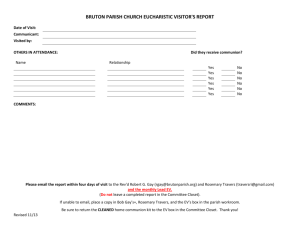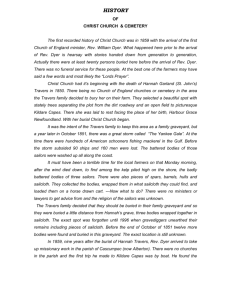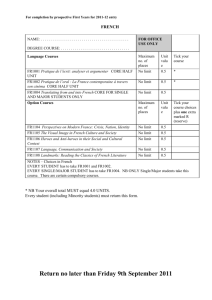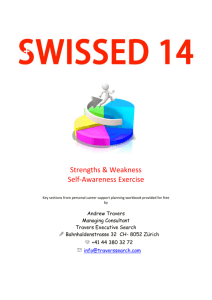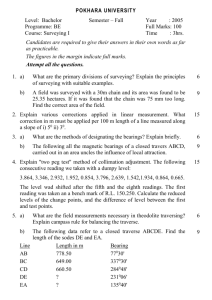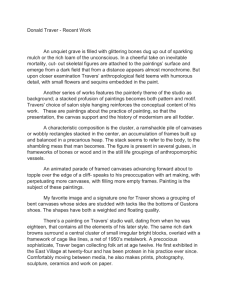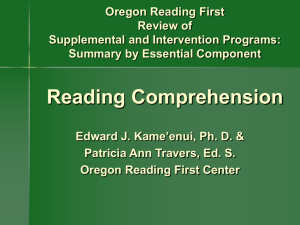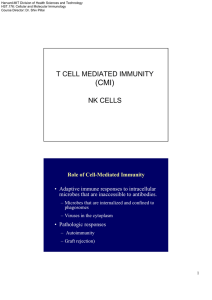Introduction Literature is a part of our cultural heritage, which helps
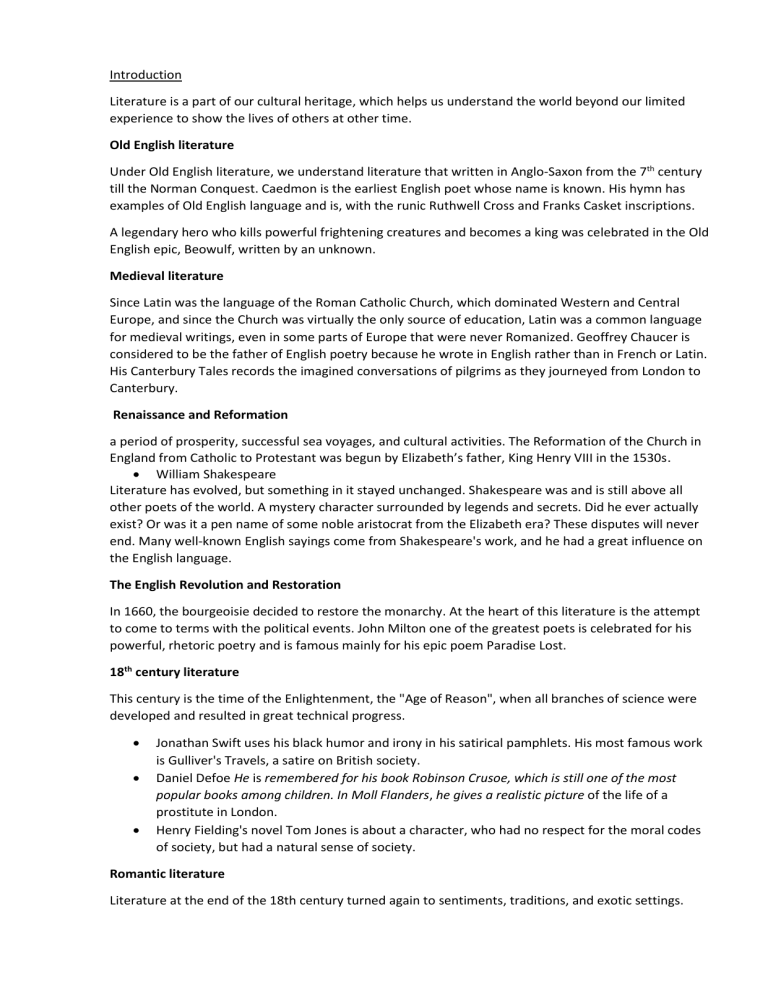
Introduction
Literature is a part of our cultural heritage, which helps us understand the world beyond our limited experience to show the lives of others at other time.
Old English literature
Under Old English literature, we understand literature that written in Anglo-Saxon from the 7 th century till the Norman Conquest. Caedmon is the earliest English poet whose name is known. His hymn has examples of Old English language and is, with the runic Ruthwell Cross and Franks Casket inscriptions.
A legendary hero who kills powerful frightening creatures and becomes a king was celebrated in the Old
English epic, Beowulf, written by an unknown.
Medieval literature
Since Latin was the language of the Roman Catholic Church, which dominated Western and Central
Europe, and since the Church was virtually the only source of education, Latin was a common language for medieval writings, even in some parts of Europe that were never Romanized. Geoffrey Chaucer is considered to be the father of English poetry because he wrote in English rather than in French or Latin.
His Canterbury Tales records the imagined conversations of pilgrims as they journeyed from London to
Canterbury.
Renaissance and Reformation a period of prosperity, successful sea voyages, and cultural activities. The Reformation of the Church in
England from Catholic to Protestant was begun by Elizabeth’s father, King Henry VIII in the 1530s
William Shakespeare
.
Literature has evolved, but something in it stayed unchanged. Shakespeare was and is still above all other poets of the world. A mystery character surrounded by legends and secrets. Did he ever actually exist? Or was it a pen name of some noble aristocrat from the Elizabeth era? These disputes will never end. Many well-known English sayings come from Shakespeare's work, and he had a great influence on the English language.
The English Revolution and Restoration
In 1660, the bourgeoisie decided to restore the monarchy. At the heart of this literature is the attempt to come to terms with the political events. John Milton one of the greatest poets is celebrated for his powerful, rhetoric poetry and is famous mainly for his epic poem Paradise Lost.
18 th century literature
This century is the time of the Enlightenment, the "Age of Reason", when all branches of science were developed and resulted in great technical progress.
Jonathan Swift uses his black humor and irony in his satirical pamphlets. His most famous work is Gulliver's Travels, a satire on British society.
Daniel Defoe He is remembered for his book Robinson Crusoe, which is still one of the most
popular books among children. In Moll Flanders, he gives a realistic picture of the life of a prostitute in London.
Henry Fielding's novel Tom Jones is about a character, who had no respect for the moral codes of society, but had a natural sense of society.
Romantic literature
Literature at the end of the 18th century turned again to sentiments, traditions, and exotic settings.
George Gordon, Lord Byron represents the so-called "Revolutionary Romantics". His work is concerned with the freedom of the individual as well as nations.
Sir Walter Scott took themes for his novels from English and Irish history.
Mary Shelley wrote Frankenstein, which is the most well-known of the Gothic novels with the horror genre that we are so familiar with in films and on TV today.
Rudyard Kipling is one of the best-known of the late Victorian poets and story-tellers. Although he was awarded the Nobel Prize for literature in 1907, his unpopular political views caused his work to be neglected shortly after his death. Critics, however, recognize the power of his work. The Jungle Books are ranked among Kipling's best works. The adventures of Mowgli, the child raised by wolves in the
Seeonee Hills of India, made the reputation as a children's writer. The Mowgli stories and other, unrelated works from the collection—such as "Rikki-Tikki-Tavi" and "The White Seal"—have often been filmed and adapted into other media.
Lewis Carroll was teaching in Oxford. Alice was a daughter of Oxford's vice-chancellor and they say that many other characters resembled real people. For example, white rabbit is Alice's father because the rabbit hole was in fact a little door hidden behind the lecturing desk where he could disappear. The queen of hearts, who ordered to behead everyone at once, turned out to be Henry the 8th.
Pamela Travers Mysterious and prickly, author P.L. Travers created the beloved governess Mary
Poppins, popularized by stage musical and the Disney film. This film is called Saving Mr. Banks, here we see Author P.L. Travers reflects on her childhood after meeting with Walt Disney, who seeks to adapt her Mary Poppins books for the big screen. Travers' difficult childhood in Australia can be seen through flashbacks, and is the inspiration for Mary Poppins. Travers idolized her loving and charismatic father,
Travers Robert Goff, whose chronic alcoholism resulted in his repeated firings from bank positions, strained her parents' marriage, and caused her distressed mother to attempt suicide. Notoriously private and prickly, Travers never married, but she had a longtime roommate, Madge Burnand, who many speculated was a romantic partner. In 1939, Travers adopted a son, Camillus, one of twin Irish boys.
Clive Staples Lewis was one of the intellectual giants of the twentieth century and arguably one of the most influential writers of his day. Lewis described himself as a "dinosaur." He was trained in ancient philosophy and made his career in medieval and renaissance studies. He saw classical thinking as superior in every respect to modern thought, and took every opportunity to show that this was true.
Lewis was also a romantic. He shows us that an inspired intellectual life is consistent with emotional vibrancy and deep love for others.
The books freely borrow characters and ideas from Greek and Roman mythology as well as from traditional British and Irish fairy tales, adapting numerous traditional Christian themes. All children from the real world, magically transported to Narnia, where they are called upon by the lion Aslan to protect
Narnia from evil and restore the throne to its rightful line. The books span the entire history of Narnia, from its creation in The Magician's Nephew to its eventual destruction in The Last Battle.
J.K.Rowling is a British novelist best known as the author of the Harry Potter fantasy series. Rowling went from being unemployed and living on state benefits to becoming a multi-millionaire in five years.
Everybody would agree that British children literature is the best all over the world. It is unique and has a great influence on education of children. It seems to me that Harry Potter books are so popular not only because of the magic and unusual adventures, but because these books show the transition from childhood to adulthood. The novels help children around the world to find out what are the consequences of our actions, to understand true values such us love and friendship, independence and knowledge, virtue and honesty, courage and confidence. Moreover, Harry Potter is a simple teenager who has common problems with bulling, jealousy and lack of understanding from the others. Books
teach how to overcome the difficulties and resist the bad influence and how it is important to make the right choice.
Cressida Cowell is an English children's author, popularly known for the novel series, How to Train Your
Dragon, which has become an award-winning film.
